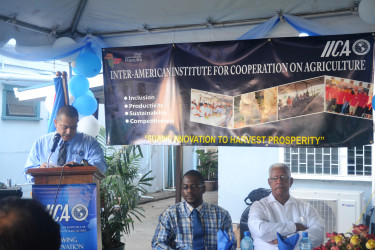The Inter-American Institute for Cooperation on Agriculture celebrated 40 years of operations in Guyana on Monday with IICA’s Representative here Wilmot Garnett calling for more regional integration and treating of agriculture as a business and a science.
Speaking to Stabroek News after brief presentations were made, Garnett stated that the partnerships in Guyana needed to address the ever encroaching imports that infringe on regional trade.
He acknowledged that regionally trade remains a stumbling block and noted that in working towards food security, education and recognition of small scale farming was key. He stated that looking forward to the years to come emphasis would be placed on value added.

Garnett said that improving the infrastructure on farms was a goal that would ultimately lead to great market value and strengthen the value chain. He said that energy cost reductions and financing were also areas that IICA would be stressing in the future.
While the entity itself could not provide micro financing, Garnett stated that the agency would be working to create a venue where small loans could be used to build credibility.
He said that “agriculture is a business,” and from an educational standpoint the dialogue that discredits the business aspect of small scale farming needed to be abolished with education commencing from early on in schools.
During the presentation, Garnett revealed that there would be 30 partnership scholarships offered to English speakers. He also noted that IICA would continue to partake in curriculum review at the University of Guyana.
IICA had been integral in the horizontal cooperation between Guyana, Brazil and Suriname in the management of the carambola fruit fly.
Through the assistance of IICA, Guyana was able to develop an information sharing system that allows easy reporting on the Carambola Fruit Fly. In its 2011 report, IICA noted that technical officers from Guyana’s Ministry of Agriculture undertook eight field trips along the Guyana-Brazil border. Agriculture Minister Noel Holder was able to meet with the Governor of Roraima in June to speak about increased agriculture trade due to the relationships forged.
Last month, IICA facilitated a workshop on Integrated Management of Water Resources and Adaption of Family Farming to Climate Change as part of Agriculture Month.
IICA is heavily invested in family agriculture focusing on productivity and sustainability for food security.
Holder was also present at the event hosted by IICA at the entity’s head office on Brickdam. The Minister congratulated IICA for its work in developing domestic market integrated systems that add to the value chain.
In his address, Holder said that the Guyana Government’s vision for agriculture is a “holistic approach to deal with not only ensuring food and nutrition security, but to also create jobs by developing more lands for agricultural pursuits, especially in the intermediate savannah, which is also the country’s second frontier for agricultural development.”
He added “It is the vision of Government to restore agriculture to its former vibrant self and to support our small and medium scale farmers.
“Our government has a strong plan for agriculture. Together we can work with all stakeholders to achieve a hinterland policy which will include building and sustaining agricultural and economic development, facilitate access to affordable credit, introduce appropriate technologies, enhance market linkages … and focus programmes on the production of sustainable portions of regional food needs.”
Holder stated that Guyana had benefitted greatly from IICA’s experiences in areas such as technology transfer and innovation in the agricultural sector, agricultural health and food safety, agribusiness, agricultural trade, rural development, natural resource management and training.
IICA specialises in agriculture and rural well-being. It is the only agency of the Inter-American System focused on those areas that offers technical cooperation, innovation and specialized knowledge to promote the competitive and sustainable development of agriculture.




